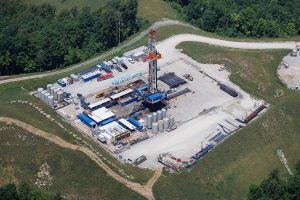How curbing oil and gas pollution can grow West Virginia energy leadership, create jobs and protect communities
By John Rutecki 
West Virginia is the nation’s number four energy producing state and has a critical opportunity to demonstrate leadership with solutions to curb oil and gas methane emissions. Commonsense action can create jobs for West Virginians, conserve resources and protect communities.
A recent panel at West Virginia University’s Energy Institute explored how reducing emissions of methane — a climate-warmer 80 times more powerful than CO2 in the short term and the main component of natural gas — can benefit the state. Students and the public heard from industry experts on the innovative technologies and policies being used to cut methane, and EDF showcased its virtual reality experience that puts participants on an oil and gas site to find and fix methane emissions.
How curbing oil and gas pollution can grow West Virginia energy leadership, create jobs and protect communities Share on XAs the Environmental Protection Agency advances federal rules to curb methane from oil and gas production, it offers a powerful tool for West Virginia’s leaders to unlock the potential of methane mitigation. Here’s what that could mean for the state.
Growing West Virginia’s economy while protecting its environment
Methane is both a more potent greenhouse gas than carbon dioxide and more short-lived. This makes cutting methane emissions one of the most effective ways for us to reduce global warming now, while also conserving a valuable energy resource.
Currently, oil and gas companies emit about 16 million metric tons of methane annually — equivalent to $2 billion in wasted natural gas. Investing in methane mitigation will benefit West Virginia’s economy by reducing this waste and creating good-paying, local jobs.
“This means jobs for West Virginians,” said Delegate Evan Hansen during the WVU panel. “We have 75,000 wells in the state and many of those are active wells. One of the things that’s going to be required is inspection of those active wells, and that means jobs for inspectors.”
There are already five methane mitigation companies operating in West Virginia, and strong methane policies would only create more opportunities for company expansion.
Cutting methane also helps protect public health. Along with methane, oil and gas operations emit smog-forming volatile organic compounds, which can lead to respiratory diseases like asthma or emphysema and increase the risk of heart disease and heart attacks. Oil and gas operations can also emit known carcinogens such as benzene.
With over a third of all West Virginians living within half a mile of an active oil and gas site, cutting pollution can deliver clean air and healthier communities while driving job creation and supporting the state’s economy.
Bolstering energy security and competitiveness
Investing in methane mitigation is necessary to keep West Virginia competitive in evolving energy markets. Investors and consumers are increasingly calling for cleaner products, and recent analysis has found that the future viability of U.S. gas exports depends on policies to reduce the fuel’s emissions footprint.
Leaders in the oil and gas industry have acknowledged the importance of reducing emissions and we’ve recently seen historic levels of support for comprehensive regulations to address methane pollution.
Additionally, amid Russia’s invasion of Ukraine and destabilization of global energy markets, it is more important than ever to reduce gas wasted via methane emissions to bolster energy security. EDF analysis shows that reducing waste of natural gas from leaks and flaring in the U.S. could provide over half of the gas the U.S. has committed to allies in Europe.
Critical opportunities
Later this summer, the EPA is expected to finalize proposed rules to reduce oil and gas methane pollution. Swift finalization of strong rules that require inspections across all wells — including low-producing sites responsible for an outsized share of emissions — is crucial. Once rules are adopted, they will enable West Virginia to develop a State Implementation Plan to determine how the state will pursue important cuts in emissions that can ensure cleaner air and new jobs across the state.
Researchers from WVU recently received $5.5 million in funding from the U.S. Department of Energy to research methane emissions from oil and gas operations. The project, led by associate professor Derek Johnson, who spoke at the WVU Energy Institute panel, will focus on methane emissions from liquid storage tanks in West Virginia, Ohio and Pennsylvania.
The Inflation Reduction Act passed by Congress last year offers significant resources for states like West Virginia to cut pollution, including $1.55 billion to support methane monitoring and innovation, while improving the accuracy of emissions reporting and drive down the costs of reducing pollution.
For too long, West Virginians have been presented with the false choice of maintaining a strong energy industry or investing in solutions to address climate change. Delivering robust methane protections can do both for West Virginia. This is an important step for West Virginia to be a leader in the energy industry while creating jobs and protecting communities from pollution.










